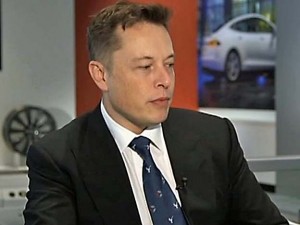It’s a risky – some would say foolhardy – strategy, but by opening up the company’s patents to its competitors, Tesla Motors founder and CEO Elon Musk said he is hoping to stimulate completion in the battery-car market.
In a pair of television interviews, the South African-born entrepreneur also noted that he is looking to develop a cheap, long-range battery that will make it possible to produce a “compelling, mass-market” electric vehicle. But Musk, who also runs the SpaceX rocket company, admitted that goal is nearly as tough as sending a man to Mars.
The list of companies that have tried and failed to break into the automotive market is long, Musk said during an interview with MSNBC’s Chris Hayes, adding that stimulating competition by giving away your patents, while unorthodox, is one way to encourage more competition – and investments — in battery-cars.
“If we succeed, it will help kick-start electric vehicle sales,” he said, noting that Tesla’s sales are expected to grow by almost 60% this year to 35,000 Model S sedans, compared with about 22,000 in 2013.
(For more on Tesla’s decision to open up its patents, Click Here.)
The challenges presented by climate change require reducing the use of fossil fuel, stressed Musk, who believes electric vehicles can make a significant reduction in the demand for petroleum. But building a competitive electric vehicle, he added, requires fresh thinking from outside the automotive business.
Despite spawning a legion of critics and doubters, Tesla proponents see the California-based Tesla as perhaps the single most successful automotive start-up in the U.S. since Walter P. Chrysler founded Chrysler Corp. in the 1920s.
However, for all of its successes, Tesla is one of the world’s very smallest automakers, Musk acknowledged. “We aren’t even next to the decimal point,” added, Musk, noting carmakers will sell roughly 100 million vehicles worldwide this year.
In addition, even if every new vehicle sold around the world were to use battery power, it would still take 22 years to replace those already on the road using internal combustion engines, he said.
The reality is that Tesla – and its competitors – are having a hard time replacing conventional gasoline and diesel power, and high price, limited range, and long charging times are three of the key obstacles to widespread acceptance of electric vehicles.
(Solar roadway project sets fundraising record. Click Here for the story.)
During a separate interview on MSNBC’s sister network, CNBC, Musk was asked which he thought harder: coming up with a competitive battery or sending a manned mission to Mars. “Probably Mars,” he said, while acknowledging the challenges of developing a low-cost, long-range battery.
But Musk said he is increasingly optimistic that Tesla and its partner, Panasonic, are on the right path as they prepare to launch construction of the so-called Gigafactory that, by 2020, is expected to be the world’s largest producer of advanced batteries.
“I am feeling really good about being able to produce a compelling, mass-market (battery) car in about three years,” he said, a reference to what had been expected to be called the Tesla Model E. Because of a trademark issue, the company is now looking for an alternate name.
Four states are now in the running for the Gigafactory, and Tesla hopes to break ground in less than a year.
(Tesla plans to have Model X battery SUV in production in 2015. Click Here for the latest.)
As for the decision to share its patents, that is not an entirely unique idea, especially within the auto industry. The development of usable airbags, which are credited with saving thousands of lives over the years, was aided by manufactures and suppliers sharing critical information. So was the development of the catalytic converter.
Musk has said he is placing only limited restrictions on using Tesla’s patents. The key restriction is that any one borrowing a patent has to agree not to initiate any kind of lawsuit against Tesla.
(Paul A. Eisenstein contributed to this story.)

